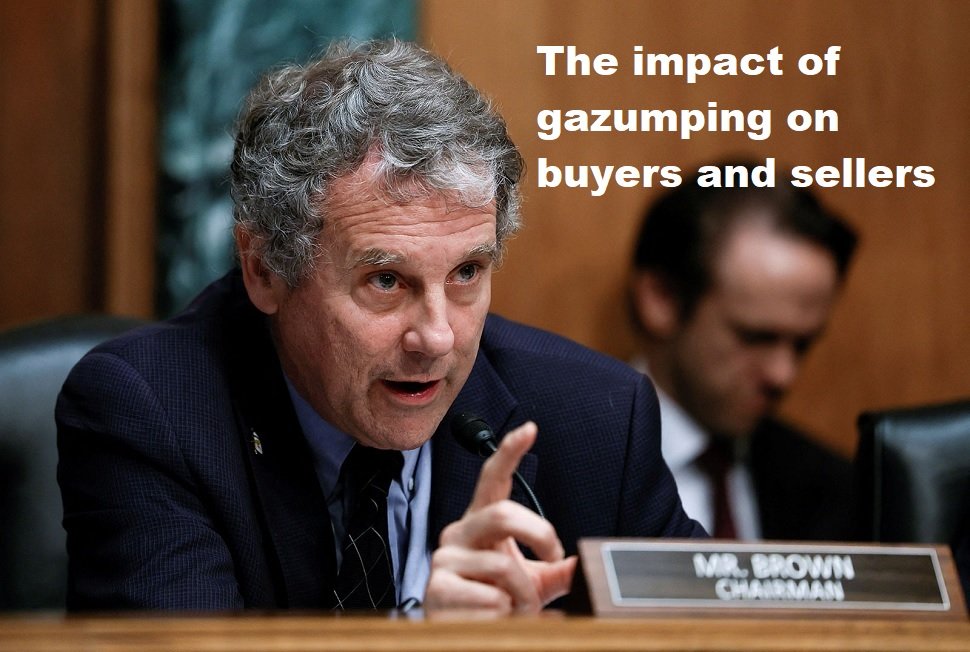Introduction to gazumping
Gazumping is a term used in the property industry to describe a situation where a property seller accepts a buyer’s higher offer after they have previously accepted an offer from another buyer. This practice often disappoints initial buyers because they have already spent time, energy, and money on the transaction process, including processing paperwork, seeking financing, and carrying out the monitoring process. Gazumping generally occurs in property market conditions that favor sellers, when demand is high and supply is limited. The concept of gazumping basically comes from the desire of sellers to maximize their profits amidst competitive market conditions. In this scenario, a seller may feel that the initial price they agreed to with the first buyer was too low compared to the potential profit if they sold to another buyer who offered a higher price. This can give rise to conflicts of interest and legal problems, because the first buyer may feel disadvantaged and his rights have been violated.
The history of gazumping can be traced back to the 20th century, where this practice became known in property transactions in England and several other countries. The property market in these countries at that time was growing rapidly and many investors were interested in investing in property. This then creates an environment that supports gazumping because there is the potential to achieve higher profits from financially better offers. Legally, gazumping is still considered legal in many countries, although this practice has received criticism from many parties. The background to the practice of gazumping is basically driven by property market dynamics and economic factors. In conditions where property demand exceeds supply and sellers have a stronger bargaining position, gazumping may occur more frequently. However, some countries have taken action to reduce this practice, such as through sale and purchase contract regulations and cooling-off periods that give buyers time to consider their offers and reduce the risk of gazumping. Additionally, other potential solutions include the use of binding purchase options or exclusive agreements between sellers and buyers to safeguard the interests of both parties. Despite efforts to prevent gazumping, this practice is still part of the property market dynamics in several countries and is a challenge for buyers looking for their dream property.
Gazumping process
In the property transaction sequence, gazumping usually occurs between the initial offer stage and the signing of the final contract. The first-time buyer submits an offer to purchase the property and waits for loan or mortgage approval. Meanwhile, sellers continue to look for other offers. If the seller accepts a higher offer from the second buyer before the contract is signed by the first buyer, then the seller will decide to sell the property to the second buyer.
As an example of gazumping in a real situation, imagine you have found your dream home and made an offer to the seller, which they accepted. You start to take care of the legal and financial documents needed for the property buying and selling process. However, before the process is complete and the contract is signed, the seller receives a higher offer from another buyer. The seller then cancels the deal with you and sells the house to a second buyer who offers a higher price.
Gazumping can result in financial and emotional losses for first-time buyers, such as legal and inspection fees already incurred, as well as time and effort invested in searching for a property. Although this practice is not illegal in many countries, gazumping is often considered unethical in the order of property transactions. Some countries have rules designed to protect buyers from gazumping, such as auction systems or binding post-bid contracts. Therefore, it is important for buyers to be aware of the risks of gazumping when searching for properties and understand the steps they can take to reduce the risk of being impacted by gazumping. Some of these steps include communicating regularly with the seller, completing all loan and legal requirements as quickly as possible, and considering insurance against gazumping if available in your area.
The impact of gazumping on buyers and sellers
The impact of gazumping on buyers is quite significant, because they have the potential to lose costs that have been incurred while the property transaction process is in progress. In addition, the time and effort that buyers have invested in searching for properties is wasted. The legal and financial implications for buyers affected by gazumping can be devastating. Legally, buyers do not have the right to ask for compensation for the losses they experience because in many cases, the sale and purchase contract has not been officially signed. Meanwhile, from a financial perspective, costs such as property surveys, legal searches and mortgage consultant fees will be borne by the buyer even if the transaction is ultimately cancelled.
For sellers, the practice of gazumping can provide financial benefits if they succeed in getting an offer that is much higher than the previous offer. This can certainly increase profits from selling the property. However, the practice of gazumping also has risks for sellers. One is reputational risk, where the seller may be considered unethical or unprofessional for ignoring the initial agreement with the first buyer. In addition to reputational risks, sellers who engage in gazumping practices also risk legal and financial complications. Legal complications may occur if the first buyer chooses to seek compensation through legal channels, even though the chances of winning are small. Meanwhile, from a financial perspective, the seller may experience delays in disbursing funds from the property transaction due to the long negotiation process with the second buyer. The situation could get worse if the second buyer ends up retracting the offer after the seller loses the opportunity to sell the property to the first buyer.
How to prevent and overcome gazumping
Gazumping is a situation where the seller accepts a higher offer from another buyer after agreeing to the previous buyer’s offer, thereby harming the buyer who had previously reached an agreement. To prevent gazumping, the first step a buyer can take is to conduct careful market research and submit a realistic, competitive offer. That way, the seller will have more confidence that the offer is fair and reflects the true value of the property. Next, as a buyer, you must work quickly and efficiently in the property transaction process. Make sure that you have funds prepared and ready to make transactions. You also need to identify and involve a lawyer or notary who can help speed up the legal process. The faster this process goes, the smaller the risk of gazumping.
Good communication with sellers and property agents is also very important in preventing gazumping. As a prospective buyer, you must maintain good relations with related parties to make it easier for the seller to notify you if another offer comes in. This way, you have the opportunity to renegotiate or match the offer to avoid falling victim to gazumping. In addition, it is important to be aware that some countries and jurisdictions have regulations or policies that can help reduce the risk of gazumping in property transactions. Therefore, you should find out whether there are these regulations around where you live and ensure that the property buying and selling process complies with these regulations. For example, in some regions, sellers must provide a receipt for the first buyer’s deposit in accordance with agreed terms, thereby reducing the risk of gazumping.









